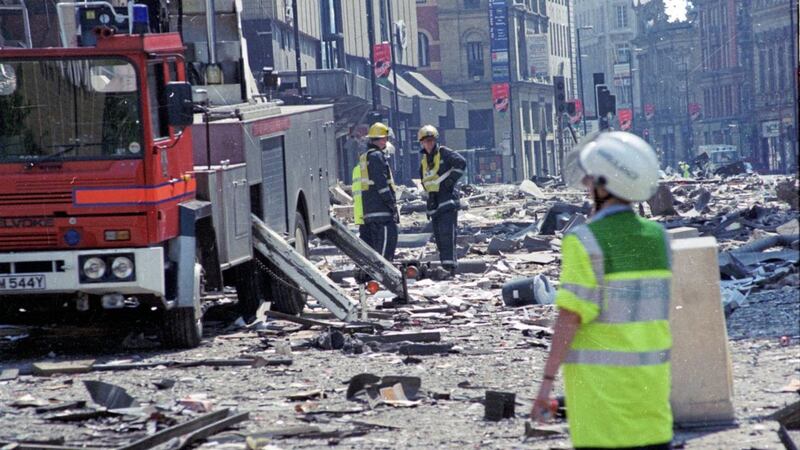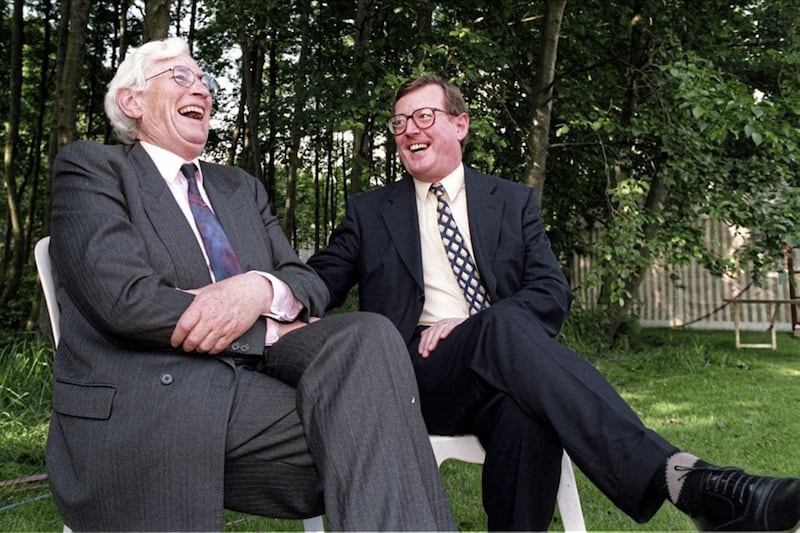IT is inevitable that a project as ambitious as Sinn Féin's will encounter bumps in the road from time to time.
The party has, for example, made determined efforts to recast its own role, never mind that of republican paramilitaries, in the Troubles as a continuum with its present mantra of 'dignity, equality and respect'.
Maintaining the moral high ground where its take on 'dignity, equality and respect' is located is, of course, made all the easier when various personalities in the DUP can, with metronomic regularity, be relied upon to come out with crass remarks about the Irish language or even its northern leader's appearance.
Just as predictable is the outrage, whether faux or genuine, with which Sinn Féin and its supporters can be relied upon to respond to the latest 'blonde' or 'curry my yoghurt' insult.
But a greater difficulty for Sinn Féin comes when echoes of its past collide with the here and now, as it did this week in the most tragic circumstances in Manchester.
Michelle O'Neill, as did every other political leader, correctly condemned the suicide bombing which claimed so many young lives as "horrific".
She added: "For something like that to happen while young people are out enjoying themselves is unthinkable."
It's a remark that suggests history never happened, because it's not unthinkable. Ms O'Neill's comment, and others like it from Sinn Féin, will have raised eyebrows among those whose memory stretches back before the Good Friday Agreement and the IRA's final ceasefire.
And therein lies a considerable and inconvenient hurdle for Sinn Féin, which for so long was the apologist for an IRA which specialised in making things "like that" happen.
Like that of the Warrington attack in 1993 which claimed the lives of a three-year-old, Johnathan Bell, and a 12-year-old, Tim Parry. Or like that bomb it planted in Manchester itself in 1996, as English newspapers reminded their readers this week.
And while some IRA men did die in the course of their various operations, most people would regard it as a considerable stretch to regard them as suicide attackers.
The IRA did, however, develop the tactic of proxy, or human, bombings - a practice which, for depravity, sits somewhere near that of abducting, murdering and secretly burying people, as it did with the Disappeared.
For its proxy bombs, the IRA essentially forced innocent people - like 42-year-old husband and father Patsy Gillespie at Coshquin in 1990 - to become suicide bombers by strapping them into vehicles laden with explosives and making them drive to its targets.
The same hinterland that includes Loughgall also includes Manchester, Warrington, Coshquin and the Disappeared, but Ms O'Neill's 'unthinkable' remark suggests that Sinn Féin would prefer us to look the other way when it comes to certain other past acts
There is no need to list everything the IRA - or indeed loyalist paramilitaries and state forces - committed during the Troubles, but it is a little difficult to explain what made an IRA bomb at Coshquin in 1990, Warrington in 1993 or Manchester in 1996 morally different from a bombing claimed by Islamic State in Manchester in 2017. Weren't they all "horrific" and "unthinkable"?
With its multiple narratives and competing versions of history, Northern Ireland is a place where the past matters more than most.
It is why resolving our so-called legacy issues is essential if the shadows of the past aren't to repeatedly threaten to pitch the future into darkness.
'Legacy issues' is, of course, a euphemism; behind every delayed inquest, unresolved murder and botched investigation are victims, real people who have been hurt as a result of the Troubles.
Ms O'Neill and the 2017 evolution of Sinn Féin clearly understands that the past matters and that its echoes ripple into the present and future - thus the defiant and unapologetic approach to its Loughgall commemorations earlier this month.
The same hinterland that includes Loughgall also includes Manchester, Warrington, Coshquin and the Disappeared, but Ms O'Neill's "unthinkable" remark suggests that Sinn Féin would prefer us to look the other way when it comes to certain other past acts.
Sinn Féin, especially through the unique contribution of Martin McGuinness, has done much to move this society from violence towards peace.
It remains to be seen whether Ms O'Neill is cast in the same mould as Mr McGuinness or if she can shake off suspicions that her leadership in the north is too closely aligned to Gerry Adams for unionists' comfort.
Sinn Féin, with others, is correct to challenge foot-dragging on the part of the British government, the security forces and others when it comes to legacy issues.
But it needs to be more up front about the republican movement's own role and the victims it helped create if the push to dealing with the past is to have wider credibility.
Unless the dignity, equality and respect it demands of itself is of a lesser standard than that which it asks of everyone else?









